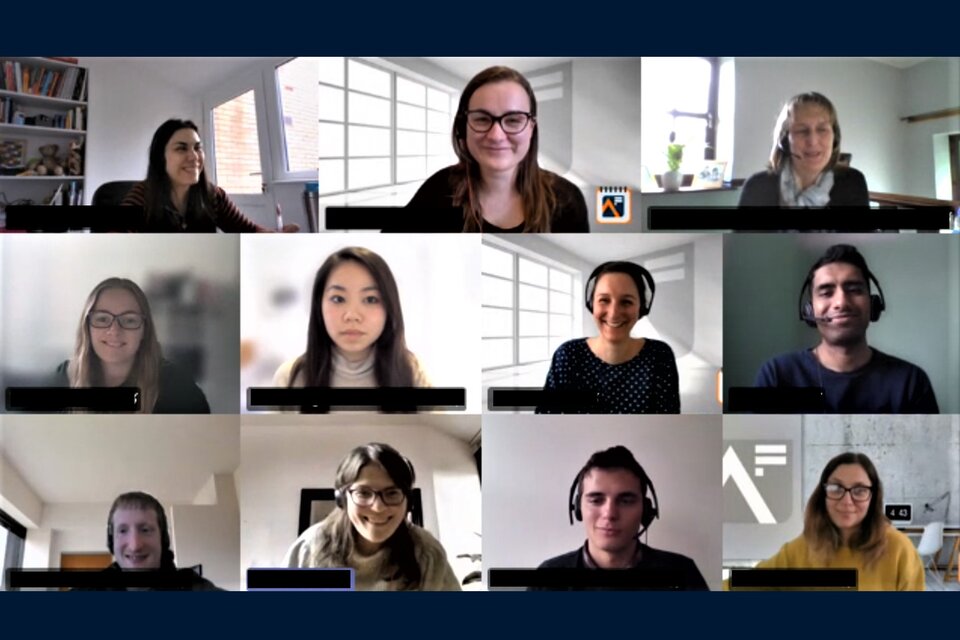As part of Analysis in Government month, this is the fourth in our series of 'Five things you didn't know about…' blog posts. Analysis in government is being used more than ever in policy, decision making and the media, this series of blog posts will share, showcase and celebrate the vast variety of professions and work within the Analysis Function.
Jump to one of our posts:
- Five things you didn't know about the people shadowing the Analysis Function People Board
- Five things you didn't know about Analysis Function fast streams
- Five things you didn't know about the Government Operational Research Service (GORS) profession
- Five things you didn't know about the role of buildings in net-zero and climate change
Five things you didn't know about the people shadowing the Analysis Function People Board

Members of the Analysis Function People Board Shadow Board holding a virtual meeting
Written by Nicholas Webster, Welsh Government
The Analysis Function's People Board (AFPB) Shadow Board (only in government would you get away with such a long name!) supports the work of the Analysis Function by shadowing a senior board specifically focusing on developing capability across government analysts.
The ultimate goal of the People Board is to ensure we have the right people in the right place with the right skills at the right time to deliver better analysis for better delivery. The role of the Shadow Board is here to bring new perspectives to board level discussions and ensure that decisions are representative of the thousands of analysts across government.
That was quite a technical explanation so below are five things you may not know about us:
1. We represent the people who make up the analysis function across government
We are 22 analysts from a range of professions and grades who come from all over government. From central Whitehall ministerial departments to Devolved Administrations to Government Agencies and Independent Regulators, we bring a wide range of experiences of analysis in government. We feed this experience into the Analysis Function's People Board as the voice of analysts on the ground.
2. We have a seat at the table
We have representation at every board meeting and we are invited to comment on all papers circulated to the board. In the three months for which we have been up and running, we have also virtually met several members of the board. The senior People Board so far has been really supportive to our insight and really appreciate the wealth of experiences we bring. As the Shadow Board develops, we are also finding our feet as to what our priorities and are also starting to support engagement work of the analysis function so that colleagues can learn more about what the Analysis Function has to offer.
3. We are passionate about Diversity and Inclusion
Many of us already work within our departments on diversity and inclusion. However, this is a chance to contribute to strategies that aim to improve diversity and inclusion across government. We want to ensure that everyone's potential is reached, regardless of their background, to ensure that the Analysis Function is as strong as it possibly can be, and everyone feels at home. We feel that while this is a complex task that needs to be addressed at all levels, the AFPB has a particularly important role in championing this work.
4. We do more than just analysis
Although we are all passionate about analysis in government, dare I say it, there's more to life than government statistics, operational delivery and policy briefs. Some of the many hobbies taken up by members of the Shadow Board include, learning the keyboard, attempting to learn Arabic, sport, gardening and playing with 5 year old family members. There are also those of us have spent a lot of the past few months bingeing Netflix.
5. We would love to hear from the colleagues we represent
Although we do come from a range of backgrounds, every one of the (at last count) around 17,000 analysts in government has a different experience. This also doesn't include the multitudes of colleagues we have who regularly do analysis but maybe don't consider themselves to be government analysts. In our role as the Shadow Board, we would welcome thoughts on what more could and should be done to develop capability across government.
If you'd like to






